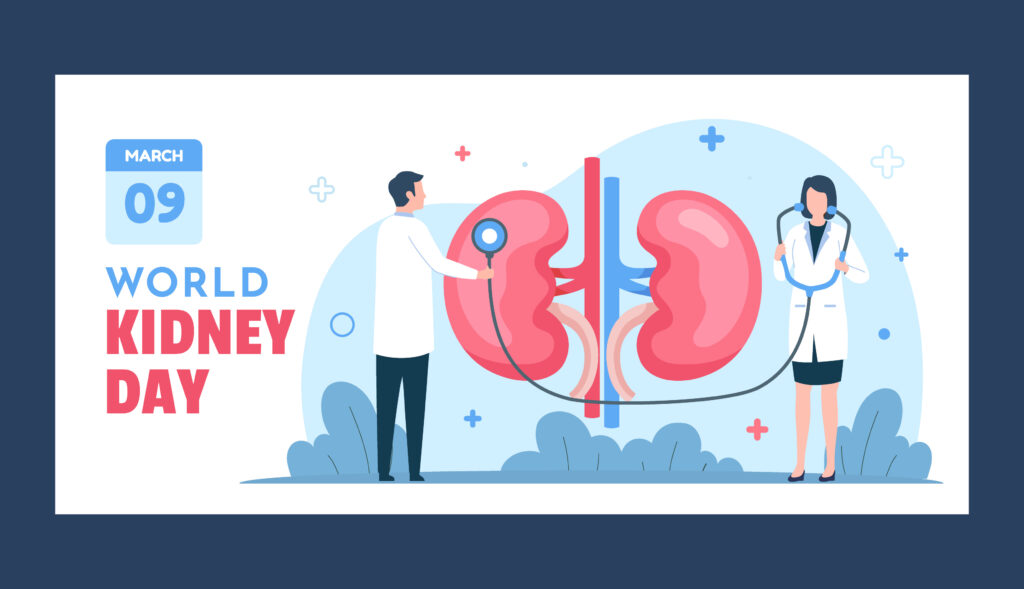Each year second Thursday of the month of March is celebrated as World Kidney Day. This year it falls on 10th March. Every year it is celebrated using a theme and the theme for this year is ‘Bridge the knowledge gap to better kidney care’. At NutriKonnect, our expertise is kidney diet. In order to bridge the knowledge gap we have herewith listed a few questions that are frequently asked by patients with weak kidneys i.e. Chronic Kidney Disease (CKD):
1. What type of food should I prefer to lower my creatinine levels?
Patients who are on a kidney diet often experience a constant stress when it comes to eating food. The stress and panic are often associated with creatinine levels. Researches have highlighted that a plant based diet proves to be healthier than a meat based diet for weak kidneys. However, there are no such special foods or ingredients that can lower the creatinine levels.
2. What type of food should I avoid to lower my creatinine levels?
Creatinine is a chemical compound which is build up in the muscles and is flushed out by the kidneys. If the kidneys are unable to flush it out efficiently, it accumulates in the blood. There is no specific diet for lowering the creatinine levels. Dietary interventions work on various parameters of your renal profile including blood urea, sodium, potassium, etc and not specifically on creatinine.
3. Can I drink more water or more fluids like vegetables (lauki/ dhania) juice to make my kidneys improve their capacity?
Fluids too are flushed off by the kidneys (urine is formed by the kidneys from the fluids that we drink). If the kidneys are weak, they may not be able to flush out fluids efficiently. Hence, it is advisable to avoid excessive fluids and importantly unwanted fluids like vegetable juices/ fruit juices/ soups/ beverages/ etc
4. Why does the creatinine level of some patient’s become normal after 1-2 months while in some it remains high?
There are 2 types of kidney problems – acute kidney problem and chronic kidney problem. As the name suggests acute is a short term issue while chronic is a long term issue. Patients with acute kidney problems can recover completely and may have dietary restrictions for a short period only. However, patients who have chronic kidney problem do face the issue of rising creatinine levels.
5. If I have a zero salt diet will my kidney function become better?
Simple answer is NO. Salt is needed by the body to maintain its normal body functions. You may need to only lower down your salt intake but you do not need to stop it completely. It is essential to keep in mind to avoid foods with hidden salt like breads, biscuits, cookies, pastas, pizzas, noodles, papads, pickles, jams, jellies, etc. and all types of packaged and processed foods.
6. I have read on internet to lower protein intake in case of weak kidneys, so I have completely stopped all proteins like dals, pulses, eggs, will my creatinine lower now?
When on a kidney diet, it is important to lower your protein intake. However, this should be done under the supervision of your Nephrologist and guidance of your Renal Dietitian, else it can lead to complications like malnutrition. So, complete banning of all proteins is not the ideal way to go ahead when on a kidney diet.
It should be noted that lowering the protein intake should not be confused with an attempt of lowering your creatinine levels, rather it is only an attempt to slow down the progression of your disease. For example, with a lowered protein intake; you may be able to live on the same stage of kidney disease for more number of years. With this you may not have to face an early initiation of dialysis.
In other words, lowering protein intake may help you remain in initial stages of kidney disease rather than progressing to higher stages.
7. I do not like the kidney diet given to me as there is less salt, less fluids and less non-veg, how can I satisfy myself?
Kidney diets are restrictive and hence adherence is a challenge. However, you can ask your Renal Dietitian for tips and tricks (like addition of lemon instead of salt to salads) to make your food more palatable even with less salt. Strict fluid restriction may be required if you have kidney problems in advanced stages not in early stages; however, a well planned and calculative effort to lower fluid intake can go a long way in avoiding complications like fluid overload.
If you do not feel satisfied without non-vegetarian food sources, you may prefer the gravy portion daily and the animal piece portion 1-2 times or as per recommendation of your Renal Dietitian.
8. How can I make my food tastier?
You can use seasonings like a few drops of lemon/ pinch of amchur powder/ mixed herbs/ oregano/ red chilli flakes/ basil/ roasted jeera powder/ few drops of tamarind pulp to enhance the flavour of your food. However, moderation is the key to adherence to a kidney diet. If you overuse them, they may cause trouble.
9. I have been advised to avoid coconut/ coconut water, should I avoid them for entire life?
Restrictions on coconut, coconut water plus fruit juices are mainly to avoid spike in your potassium levels. Potassium levels if left uncontrolled can lead to changes in the normal rhythm of your heart. It can worsen giving rise to a heart attack or it may even lead to sudden cardiac death. Hence, it is advisable to avoid these food items.
10. I have heard that salt substitutes are healthy for BP, hence now I am having low sodium salt only to tackle my kidney problem
It is true that low sodium salts are recommended to lower the blood pressure (BP), however; these salts should not be used for kidney problems as it may lead to silent rise in potassium levels, which is dangerous. One should use normal iodized salt and not low sodium salt when on a kidney diet.
11. My wife is a working woman, she cannot cook food separately for me; how do I manage my kidney diet then?
In such cases, you should opt to cook food with less salt for the entire family. If any members need extra salt, they may add it separately. It is a healthy habit to cut down salt from chapatis/ parathas/ rice/ salads, etc for the entire family. This will help you manage your salt.
If you are a non-vegetarian, you may choose to have non-veg sources only on once a week, this will help you lower meat intake.
12. I am an Indian living in a foreign country with a lesser access to Indian food, how can I manage being on a kidney diet?
In foreign countries, one may have a lower access to chapatis, parathas, vegetables, etc. If procuring food is a challenge, one should try to learn a few healthy cooking methods.
A distorted chapati is healthier than a well shaped burger or pizza, a simple masala bhaat or curd rice is nutritious than an exotic Thai rice or Mexican rice. The exotic food items are all loaded with additives for example, sauces. Rather than packed gravies, one should make simple vegetables using simple ingredients. One should not prefer instant eatables like instant gravies/ instant oats/ etc, rather prefer cooking it the right from scratch at home. This will involve time and effort but is worth to take care of kidneys.



